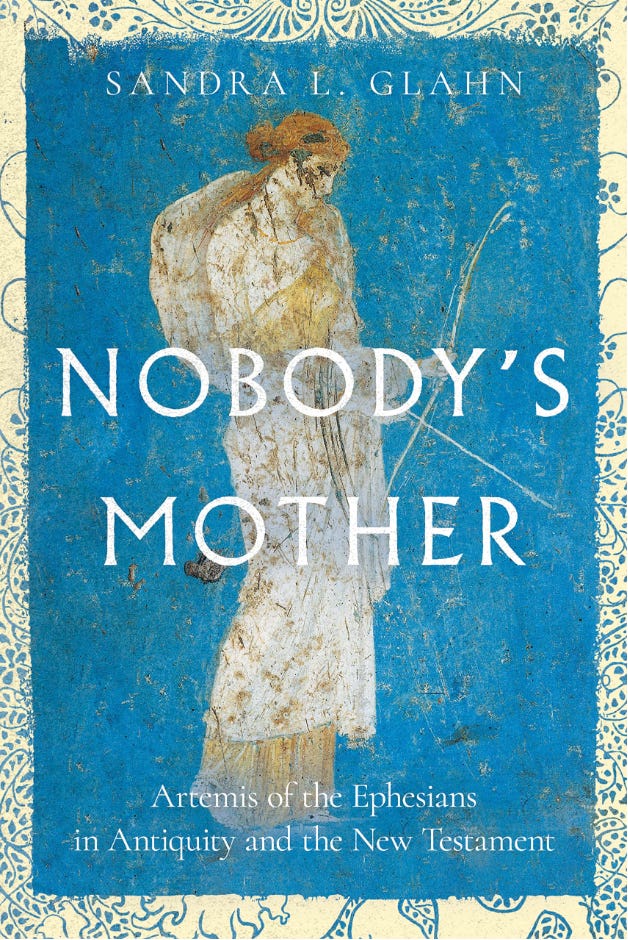Paul and Contextualization: I’m Not Sure That Word Means What You Think It Means (by Sandra Glahn)
By Sandra Glahn
Ever seen drawings of the ancient goddess Artemis? If so, she was likely carrying a bow and arrow. More recent iterations of her as Diana/Wonder Woman still depict her that way—with shield, bow, and arrow.
Ancient literature includes many references to Artemis as a master of archery. (And make no mistake—Artemis was as likely to shoot at females as males.) We see similar descriptions of her in the epigraphic evidence. In the ruins of ancient Ephesus, her natal city near what today is Kuşadasi, Turkey, archaeologists discovered “The Oracle Inscription.” In it, Artemis is described using a variety of archery terms: “Artemis of the golden quiver,” “shooter of arrows” and the “straight-shooting one.”
What does Artemis have to do with Bible? Probably a lot.
Talking about spiritual warfare in his epistle to the Ephesians (Eph. 6:10–18), the apostle Paul wrote to people in this city that was Ground Zero for Artemis’s cult. Her temple there was one of the Seven Wonders of the Ancient World. And Acts 19 records a disturbance caused by her silverworkers, who were upset at the economic fallout from teaching that said “gods made with hands are not gods at all” (v. 26). Apparently, Paul never outright blasphemed their deity. He just cast a lot of shade.
About a decade after that disturbance, Paul wrote back to the church in Ephesus, and in his letter he gave a reason for believers to armor-up with the breastplate of faith: to extinguish “flaming arrows of the evil one” (Eph. 6:16). For his readers, arrows were as connected with Artemis as for us kryptonite is connected to Superman.
Today Ephesus is silted in. But at the time of the earliest Christians, this port city had harbors and access to great roads. Strategic geographically and politically, Ephesus was an important site of early Christianity. Priscilla and Aquila eventually moved there with Paul (Acts 18:19). Ephesus served as home base for him for three years (c. AD 50–53). And to or from Ephesus he probably wrote 1 Corinthians (see 1 Cor. 16:8), the Book of Ephesians, and 1 and 2 Timothy. The addressee of the latter, Paul’s protégé, continued to minister in Ephesus even after his mentor left (1 Tim. 1:3). And tradition places Jesus’s mother in Ephesus along with the elder John after his exile on Patmos. John reportedly wrote his Gospel near Ephesus, along with 1, 2, and 3 John. That makes Ephesus an important city for New Testament backgrounds!
Acts records some key events that happened there. Sorcerers burned magic books (Acts 19:18–20), Paul taught daily there, and an uprising made him decide to depart earlier than planned (19:23–20:1). Why? Opposition from followers of Artemis.
Michael Immendörfer in Ephesians and Artemis notes that in writing Ephesians, Paul “adopts local Artemis terminology and infuses it with new meaning or defines it in relation to Christ, so that cultic terms are used to criticize the cult.” Because Paul’s readers knew the Artemis lingo, they would have recognized allusions when Paul made direct attacks via indirect teaching. He never came right out and said she was a false god. He just said gods made with hands aren’t really gods. He let them do the math.
Three of seven titles ascribed to the Ephesian Artemis (lord, savior, god) appear multiple times in Paul’s letter to Timothy addressing how to handle false doctrine in Ephesus (1 Tim. 1:3). In fact, all three titles appear in his salutation—but ascribed to Christ. Pauline epistles usually begin with greetings like “grace and peace to you”—but not this time. To Timothy he writes, “Paul, an apostle of Christ Jesus by the command of God our Savior and of Christ Jesus our hope, To Timothy my true son in the faith: Grace, mercy and peace from God the Father and Christ Jesus our Lord” (1:1, 2). He crammed a lot of titles in there. Everything Artemis does Jesus does better.
We see something similar in 2 Timothy. Paul writes of Christ who saved and called believers before the world began, “and was made manifest now through the manifestation of our Saviour Jesus Christ… (2 Tim. 1:10, YLT). Notice that word “manifest?” It is also a title ascribed to Artemis. Ephesus scholar Paul Trebilco writes, “Although the point is not explicitly polemical, the readers of 1–2 Timothy are being told by the author that the true ‘manifestation’ of a god in this world is Jesus Christ, not Artemis. So the language does have a polemical edge to it, for those with ears to hear. But in addition, the language used in the city of Artemis is here being applied to Jesus. This is a contextualization of the message—the adoption of the epiphany scema and its associated language as a vehicle for the expression of the author’s Christology.”[1]
Paul understood the opposition, but he was sly in defying it. He taught boldly, yet he didn’t smash statues or call down judgment on the lies. The city clerk, in breaking up the Ephesian silverworkers brouhaha, had to concede that Paul and his followers had “neither robbed temples nor blasphemed our goddess” (Acts 19:37).
Clever. Insightful. Savvy. In communicating how believers are to live in their cultural soup, Paul proves himself shrewd. He reads his context, speaks fearlessly, yet avoids hate speech. He seems less interested in degrading Artemis than in exalting Jesus, co-opting her titles and terminology to communicate his Lord’s superiority.
As gospel workers, we do well to borrow our methods from the apostle to the Gentiles as we train people to turn from the world’s systems and follow hard after Christ the Lord, the Savior, the Manifest One, our God.
Sandra Glahn is president of EPA, the Christian media association with a reader reach of 21+ million. She is also a seminary professor and the author of Nobody’s Mother: Artemis of the Ephesians in Antiquity and the New Testament (IVP Academic) due out October 10. You can read my series based on her book by following these links:
[1] Paul R. Trebilco “Engaging—or Not Engaging the City: Reading 1 and 2 Timothy and the Johannine Letters in the City of Ephesus, in Steve Walton, The Urban World and the First Christians, (Grand Rapids: Eerdmans Publishing Company, 2017), 169.






Things make more sense thank you .
To be honest I was taught John died while in exile. Wow what an eye opener. It’s interesting to note that Paul never wrote and hate Or calling for burning anything down.